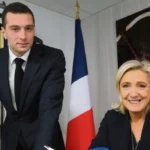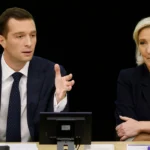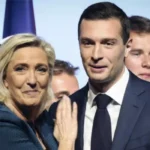Symbolic meetings. This Monday, European Foreign Ministers will receive their Israeli and Palestinian counterparts in Brussels, separately, to listen to them and try to convince them of the need for a political solution in Gaza and the West Bank.
The head of Israeli diplomacy, Israel Katz, will meet EU ministers in the morning, then it will be the turn of that of the Palestinian Authority, Riyad al-Maliki, in the afternoon. No meeting between the two men is planned and no decision is expected, but for Europeans, the simple presence of the two men on the same day in Brussels is already a “strong symbol”, in the words of a diplomat.
“Don’t have too high expectations”
Israel cannot build peace “only by military means”, insisted this Monday, the head of European diplomacy Josep Borrell, insisting on “a two-state solution” before meeting the heads of Israeli and Palestinian diplomacy. “What other solutions are they thinking of? “, he told journalists in Brussels. “Make all the Palestinians leave? Kill them ? “, he added.
The statements of the head of European diplomacy Josep Borrell, who accused Israel on Friday of having “financed” Hamas in an attempt to weaken the Palestinian Authority of Fatah, could however be a source of tension. “We believe that a two-state solution must be imposed from the outside to bring peace,” he also insisted from Valladolid in Spain.
The heads of EU diplomacy will also meet, during a working lunch, their Egyptian counterparts Sameh Choukry, Saudi Faisal bin Farhane and Jordanian Ayman Safadi, as well as the secretary-general of the Arab League Ahmed Aboul Gheit. So many countries and organizations that could play an important role – both economic and political – after the war.
“I think we should not have too high expectations” about this day, underlines a diplomat, referring to “a complex ballet. (…) The idea is to have an in-depth discussion with all the participants, exchange points of view and try to understand where everyone stands.”
EU countries are concerned about the number of civilian casualties since the unprecedented attack launched by Hamas against Israel on October 7, and have repeatedly called for humanitarian truces. But, very divided, they have so far failed to go beyond, and agree on a call for a ceasefire, to which certain countries, such as Germany, are opposed. , emphasizing Israel’s right to defend itself.
Advanced discussions on a mission in the Red Sea
Europeans are considering sanctions against Israeli extremists in the West Bank, where more than 360 Palestinians have been killed since October 7 by the Israeli army or Jewish settlers, according to the Palestinian Health Ministry. But no decision is expected on Monday on this subject, diplomats said.
European ministers will also discuss the implementation of an EU mission in the Red Sea to protect the commercial fleet from attacks by Houthi rebels from Yemen. Discussions have progressed well, according to several diplomats, and an agreement could be found on the modalities during an upcoming meeting of EU foreign ministers on February 19.
This mission should mobilize three European warships. Italy, France and Belgium have indicated that they are ready to participate. Its mandate will allow it to shoot down any missile, rocket or drone launched by the Houthi rebels against merchant ships, but it will not be authorized for strikes against land targets in Yemen, these diplomats clarified.
Americans and British have carried out several strikes against Yemeni rebels, who claim to attack ships linked to Israeli interests, in solidarity with the Palestinians in Gaza.
This article is originally published on leparisien.fr






